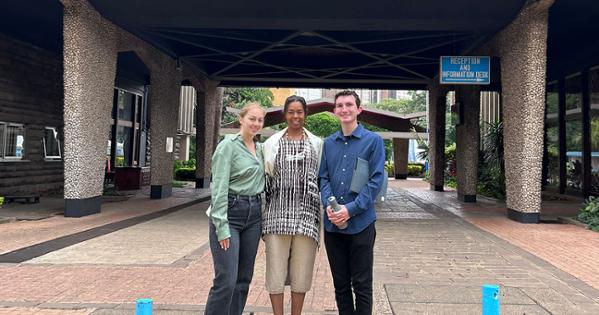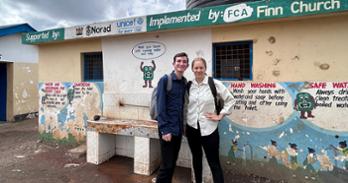Take the Classroom into the Real World with Internships Abroad

By the end of 2022, as many as 685 million people were estimated to be living in extreme poverty. The World Bank defines extreme poverty as “those who live on less than $2.15 per person per day at 2017 purchasing power parity.”
Since 2011, Sub-Saharan Africa has been the region with the “largest and growing share of the world’s extreme poor,” accounting for 59 percent of the population of people living below the international poverty line as of 2019, according to the World Bank.
SIS professor Angela Pashayan has more than a decade of field experience working to reduce extreme poverty in Peru, India, Nepal, Indonesia, Tanzania, and Kenya. She’s also spent several years researching and working in informal settlements—defined by Pashayan as places in urban cities that have not been zoned residential, have no infrastructure, and were formed by citizens looking for work during the modernization period of development.
Over the summer, Pashayan spent six weeks in Nairobi, Kenya, conducting interviews with experts and residents in the Mukuru Slum, which is estimated to be home to more than half a million people.
Summer 2023 was the first time Pashayan included students from AU in her research. As part of an internship abroad experience, two undergraduate students joined Pashayan in her current research titled, "Settling the Informal Settlements." Pashayan led students Sophie Cazares and Leo Jaques, both SIS/BA ’25, through conducting primary research on extreme poverty.
We caught up with Pashayan and Cazares to learn more about their time in Nairobi and how undergraduate students can get involved in research and internships abroad during their time on campus.
Research Up Close
Cazares, an SIS junior, learned about the research opportunity in Kenya during the 2023 spring semester. The research project piqued her interest due to its human rights and environmental lens, and she already knew she wanted to go abroad to Kenya to complete an internship. The experience provided her with a hands-on opportunity to apply what she was learning about in the classroom—like international development and human rights—to the real world.
“We got to see extreme poverty up close and got to talk to people who are affected by it directly,” Cazares said. “It’s one thing to learn about it in a classroom and be told about the poverty, but it’s another thing actually to see it.”
During a typical day, Cazares and Pashayan spent time interviewing experts on their views about what can be done to improve livelihoods and integrate residents of informal settlements into formality. This entailed a multidisciplinary approach, speaking with experts in architecture, land tenure, health, economics, and the climate/environmental sectors to get a clearer picture of what it will take to settle the informal settlements.
Through the interviews, Pashayan, who has 13 years of first-hand knowledge on informal settlements, was able to ask experts about who owns the land on which the Mukuru Slum is located, what environmental health impacts may come with living in the informal settlement, and discuss how the micro-economy of the informal settlement works. Pashayan explained that, within the Mukuru Slum, people are living on about $1.90 a day.
"Nairobi, like other urban cities, has certain areas zoned for residential living, and other areas zoned for industry or urban services like trash dumps," Pashayan explained. "During modernization, people migrated from rural to urban areas looking for jobs. They settled informally near industrial land and never left. There were never plans for residential pipes to go into that area other than for industry."
“Settling the informal settlements means finding a pathway forward so that those areas can become a legal and safe place to live,” which includes ensuring that systems are in place to provide water, electricity, and waste removal, Pashayan added.
In addition to interviewing international development experts, the research also included speaking with residents who currently live in the informal settlements. Cazares recalled one particularly striking day when she was granted permission to enter the Mukuru Slum, where she had the opportunity to interview people working in school zones and interact with some of the students.
After conducting interviews with experts and researching informal settlements, Cazares said actually seeing the Mukuru Slum up close was the thread that connected and contextualized all of the information.
“That day, specifically, was the most important day because we were on the ground and got to connect all the interviews we had done previously—to actually see it and be there and talk to people who live in informal settlements,” Cazares said.
How To Intern Abroad
As an undergraduate, SIS students can complete an internship abroad that aligns with their academic program requirements. Students can identify their own internship abroad or apply to participate in one of the AU Abroad Centers. The Office of International Programs at SIS works to support students by helping them through the Global Safety approval process and offers funding through grants to offset the costs related to interning abroad.
“American University offers students tremendous opportunities in experiential learning, which allow students the opportunity to apply the knowledge and theory that they’ve learned in the classroom and apply it to hands-on learning that grounds their knowledge in practical, real-world experience,” SIS Director of International Programs and Partnerships Christine Gettings said. “International internships deepen this learning by also giving students the chance to learn in and experience a new culture and environment—it helps them gain skills that are important to future employers, such as intercultural competency, communication, problem-solving, and adaptability, all while expanding their professional network.”
First-Hand Research Experience Makes an Impact
For Pashayan, conducting research with student interns over the summer provided an opportunity to “dispel myths that research is boring.”
"It was very rewarding to see the students so excited about conducting research and writing notes that may become part of the published work," Pashayan said.
Pashayan has a forthcoming book titled Below the Proletariat that discusses what life is like in the Mukuru Slum and compares what residents of informal settlements have identified as a need, versus what they are being offered by development organizations. Her summer research will be published in short version as a journal article, and in longform as her second scholarly book titled "Settling the Informal Settlements."
Looking ahead, Pashayan said she would gladly take AU students to Nairobi in the future to teach them about research, as well as the social determinants of health, food security, or the impact of climate change in informal settlements.
"Nairobi is like a second home to me. So long as AU has a campus in Nairobi and they are willing to have me there, I look forward to helping students understand the realities of development and learn more about the clients we serve as development professionals," Pashayan said. "I'm always willing to spend the summer in Nairobi to guide students through learning about the multidimensions of poverty through lecture, analysis, and first-hand experiences."
For Cazares, the internship in Kenya helped her to see the intersectionality of the disciplines in which she’s interested, including human rights and climate change. Cazares said her time in Nairobi helped her realize that she wants service to be a key part of her future.
“Being there helped me further realize that I do want to do something that directly impacts people and directly helps them improve their lives because this world needs a lot of help,” Cazares said.
